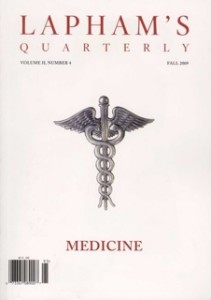
The God In the Machine, Lewis H. Lapham, Lapham’s Quarterly, V.II,No.3
President Barack Obama during his first months in office seldom has missed a chance to liken the country’s healthcare system to an unburied corpse, which, if left lying around in the sun by the 111th Congress, threatens to foul the sweet summer air of the American dream. The prognosis doesn’t admit of a second or third opinion. Whether on call to the Democratic left or the Republican right, the attending politicians and consulting economists concur in their assessment of the risk posed by the morbid emissions. The country now pays an annual fee of $2.4 trillion for its medical treatments (16 percent of GDP); the costs continue to lead nowhere but up. Fail to embalm or entomb the putrefying debt, and it’s only a matter of time—ten years, maybe twenty—before the pulse disappears from the monitors tracking the heartbeat on the floor of the New York Stock Exchange.
So say the clinicians in Washington, and I don’t quarrel with the consensus. If I can’t make sense of some of the diagnoses or most of the prescriptions, at least I can understand that what is being discussed is the health of America’s money, not the well-being of its people. The symptoms present as vividly as the manifestations of plague listed in Thucydides’ History of the Peloponnesian War, but they show up as an infection of the body politic caused by the referral of the country’s medical care to the empathy of accountants and the wisdom of drug dealers.
If I can’t make sense of some of the diagnoses or most of the prescriptions, at least I can understand that what is being discussed is the health of America’s money, not the well-being of its people.
This is the most cogent comment about the current debate over reform of the health care system I’ve encountered.
Thank goodness for Lewis Lapham. More:
The medieval church marketed its healthcare product as the forgiveness of sin, in the form of Papal indulgences intended to preserve the vitality of the immortal soul. In an age that places a higher value on the flesh than it does on the spirit, the guarantees on the label promise to restore the blooms of eternal youth. To the extent that we construe physical well-being as the most cherished commodity sold in the supermarkets of human happiness, we stand willing to spend more money on the warrants of longevity than we spend on lottery tickets and cocaine. Our consumption of medical goods and services constitutes the performance of what Thorstein Veblen in The Theory of the Leisure Class characterized as a devout observance—the futility and superfluous expense of the exercise testifying to its value as an act of worship. The more health product that we conspicuously consume, the more of us feel conspicuously ill. To express our devotion we magnify every “riddling distemper” the flesh is heir to, deprive ourselves of food and blood, discover diseases where none exist, incise ourselves with liposuction and the angiogram. The pharmaceutical companies step up the dosages of terror in their print and television advertising; volunteer committees of vigilance gather in city parks to keep a sharp watch for obese wastrels who neglect their aerobic exercises, smoke cigarettes, fail to ingest their antioxidants, refuse to drink their pomegranate juice. We learn to think, as do the characters in a Woody Allen movie, that we become commendable, or at least interesting, by virtue of the stigmata verifying our status as victims and attesting to our worth as patients.
My only gripe with the Medicine issue is that for whatever reason, Ivan Illich, (author of the classic Medical Nemesis,) wasn’t included.
The Lapham Quarterly is the single most edifying and provocative publication now being produced in the sphere of the ‘public intellect.’ Of course, Lapham himself is a terrific essayist. As it turns out he’s also a visionary assembler of ideas, given the brilliant collections organized around themes he’s issued in the form of his journal. Above all, The Lapham Quarterly honors the intellect of the reader by juxtaposing classical and modern thinking around the themes, and then allowing the reader to reason through a robust clash of historical and contemporary perspectives. It’s not all words. Each edition includes graphic evidence and images aimed to do what 1,000 words cannot.
The web site for The Lapham Quarterly has evolved to offer content not in the journal. Highly recommended. At the web site are Lapham’s introductions for each issue and its centering theme. Right now, Lapham is second-to-none as a commentator on current events.
